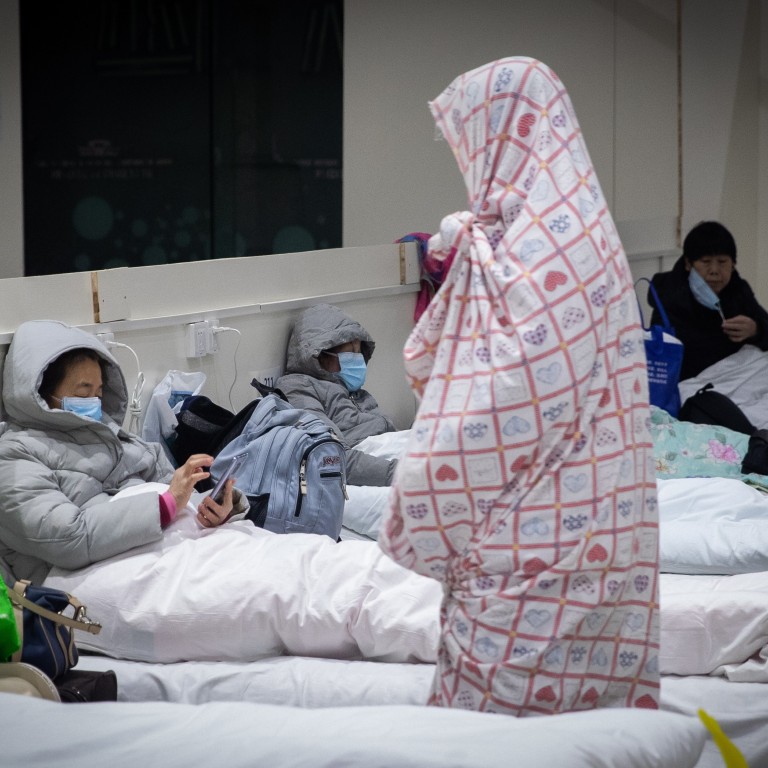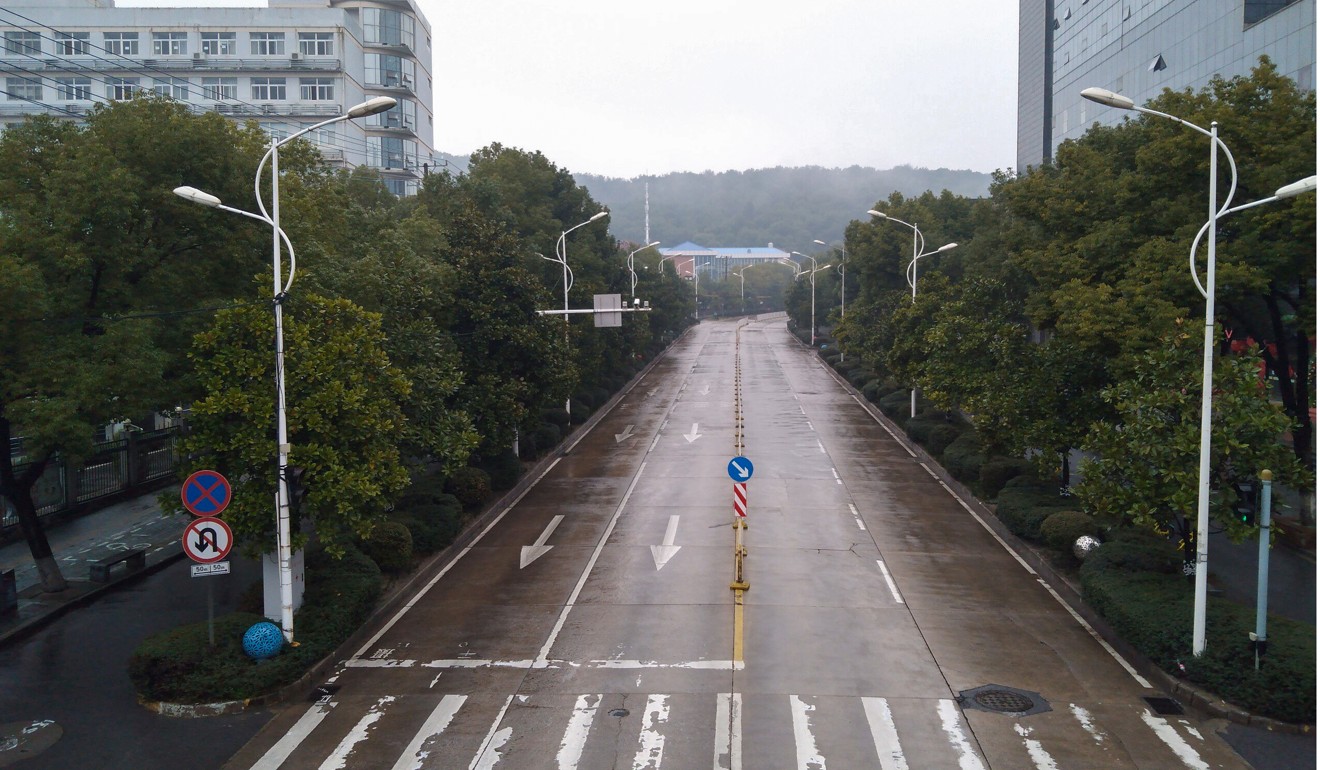
Desperate patients struggle to get help in coronavirus-hit Wuhan as others wait it out
- Fever clinics are packed as those who fall ill are forced to queue for testing kits and the chance of a hospital bed
- For others, life under lockdown is frustrating but they are doing what they can to stay active and healthy
Last week it happened. Her 70-year-old father had been coughing for nearly 10 days and it was getting worse, her mother, 68, was barely eating. Xiao herself had no appetite and a low fever. She checked their temperatures – both had low fevers, too.
Two days later, CAT scans at the Wuhan Hospital of Traditional Chinese Medicine showed her parents both had lung infections, while she had milder symptoms.
Hospitals in Wuhan – a city of 11 million people where the outbreak began – were already overloaded with patients. They were told to get testing kits for the new virus strain and if the results were positive they would have to go on a waiting list for hospital beds.
There were a lot of people in the same boat. At every hospital, fever clinics were packed and a limited number of testing kits were available for those at the front of the queue. They were handed out once the doctors had finished consultations for the day, which could be after midnight.
“I turned up at the fever clinics and they were all crowded with people just like me – with the same shadows on their CAT scans and the same desperate looks on their faces. I couldn’t get a slot [to see a doctor] so I tried another hospital, then another hospital,” the 42-year-old said.
The family’s plight is shared by many in Wuhan who have been struggling to get medical care since the outbreak began – it is thought to have started at a wholesale seafood market in the city – in December.
As the virus spread, Wuhan was put under lockdown on January 23, with residents banned from leaving the city. Public transport was stopped and private cars were not allowed on the road except for emergencies. The Lunar New Year holiday was extended for 14 days in a bid to contain the virus. Other cities in Hubei province, where Wuhan is located, were also locked down – affecting nearly 60 million people.
But the number of infections continued to jump, in Wuhan and across the country. More than 10,000 people in Wuhan had been diagnosed with the virus by Wednesday, with over 20,000 patients with fever told to stay home in isolation amid a severe shortage of medical supplies and hospital beds.
It took three days for Xiao to get hold of testing kits, and the family was told to stay home and take some medication while they waited an anxious 48 hours for the results.
“My father is coughing so much that he says it feels like he will cough his heart out,” she said, adding that he was too weak to get out of bed, while her mother was too dizzy to stand.
Xiao was looking after all of them. “I can barely stand, but we have no one else. It takes a lot of energy just to prepare porridge, but no one touches it and I have to throw it away,” she said.
She sought help from the community neighbourhood committee, hoping they could deliver food, but was told they did not have the resources. “All I’m hoping for is that my parents can be admitted to hospital to get proper treatment,” she said. “I can isolate myself in the apartment [to recover].”
On Thursday, after testing positive, her parents did get hospital beds, albeit in two different places. Xiao is meanwhile being treated in an isolation centre. “We’ve been separated, and I don’t know if I should be happy or worried,” she said, but she hoped the “hardworking angels in white coats” would be able to help her parents.

For those in the city who are not dealing with illness, life is on hold because of the quarantine order. The streets are eerily quiet, with disruptions to work and people avoiding normal activities like going out to dinner, or even leaving their homes.
Others are trying to do what they can to help. Peng Sen, who owns a trading company in Wuhan, told his staff to stay home until the outbreak was over. No one knows when that will be, and Peng has prepared for the worst – he thinks business might not return to normal until June.
The 48-year-old could not stay home and watch the crisis unfold, so he got official approval to drive the sick to hospitals and help them get medicine. He isolates himself in a separate room from his family when he returns home.
Chinese scholar blames Xi Jinping, party for not controlling coronavirus outbreak
Peng also contacted his alumni in the United States to send medical supplies, and has ordered items such as protective gear directly from factories that he delivers to hospitals.
But he said what the virus patients in Wuhan needed most was hospital beds.
“It’s not in my power to offer them this,” Peng said. “I’ve also gone to a lot of trouble to find masks, but they turned out not to be up to the protective standard for red zone [intensive care] use. I’m not physically tired or scared, but I’m frustrated when I can’t help.”
For others, it is a case of accepting the lockdown as a necessary measure to contain the outbreak and trying to get on with life as much as possible.
Xie Bing, an executive with an electronic components supplier, should have spent the Lunar New Year with relatives in his hometown of Huangpi, but instead he has stayed home – only going downstairs to take out the rubbish every two days.
It has been a frustrating time for the 40-year-old at home, glued to his phone for updates on the worsening outbreak. “I don’t know when this will end – maybe in April? But I do know that panicking will not help,” Xie said.
Feeling “bored and restrained” he decided to put his phone down and keep active at home – exercising by doing sit-ups and push-ups, reading, and spending more time with his two children, aged 11 and five. They have also been cooped up at home since January 23, and Xie arranged online tutoring for them every day to prepare for when they go back to school.
His wife, a university lecturer, was spending her time preparing lectures for when classes resume. “College students won’t go back to campus until the outbreak is contained, but the teaching will probably be done online [until then] so she is preparing for the new semester,” Xie said.
Marketing executive Fang Ninghua, who works for a state-owned firm in Wuhan, was also trying to keep healthy and active during the lockdown, making sure the family got enough sleep and did some exercise. He was not sure when he would return to the office, but was working from home for now.
“We report our temperatures during teleconference every day,” Fang said. “Wuhan is in deep trouble with the coronavirus outbreak, but not all of our agents are in [China] so we need to support their work.”
He believed he was doing his bit by staying home.
“I try to stay healthy and not get infected and be a further burden on the health system,” he said. “I don’t go out and walk about and pose a threat to others – that’s all I can do.”

